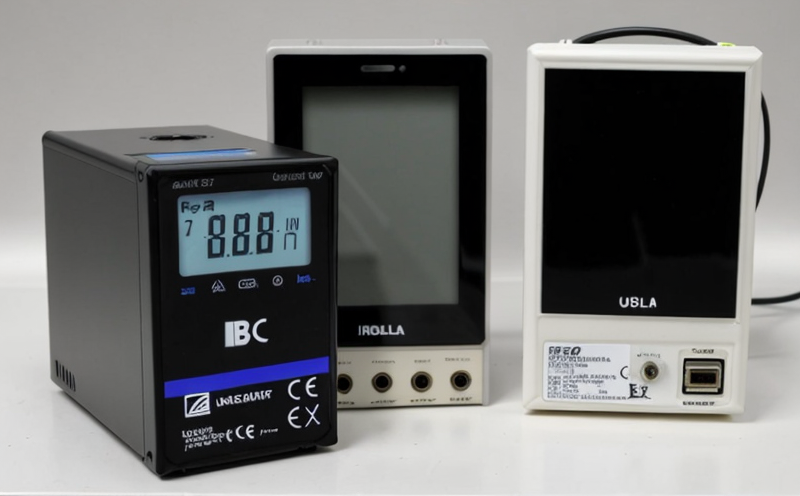UL 1642 Consumer Electronics Lithium Cell Testing
The UL 1642 standard is a critical benchmark for ensuring the safety of lithium cells used in consumer electronics. This standard sets stringent requirements to prevent the hazards associated with lithium cell failures, including short circuits and thermal runaway. Compliance with this standard ensures that the batteries perform reliably under various stress conditions and meet industry expectations for quality and safety.
Our UL 1642 testing service is designed specifically for consumer electronics manufacturers who need to ensure their products meet these stringent requirements. Our team of experts uses state-of-the-art facilities to conduct a comprehensive suite of tests that include both mechanical and thermal stress evaluations, ensuring that every cell meets the highest safety standards.
Compliance with UL 1642 is essential for several reasons:
- To avoid potential product recalls
- To enhance consumer trust in your brand
- To ensure regulatory compliance and market access
- To protect against legal action related to product safety issues
The testing process involves a series of rigorous procedures that simulate real-world conditions. This includes high-temperature cycling, short-circuit tests, overcharge protection, and pressure retention tests. These tests are not only designed to identify potential hazards but also provide valuable insights into the performance characteristics of the batteries.
Our UL 1642 testing service is comprehensive, efficient, and tailored to meet your specific needs. We use advanced equipment and follow strict protocols to ensure accurate and reliable results. Our team of experienced engineers will work closely with you throughout the process to ensure that every aspect of your product meets the required standards.
In addition to the standard tests, we also offer additional services such as custom test setups and failure analysis to help identify any potential issues early in the development process. This proactive approach ensures that any necessary adjustments can be made before full-scale production begins, saving you time and money in the long run.
Applied Standards
The UL 1642 standard is widely recognized and accepted globally for its comprehensive approach to ensuring the safety of lithium cells. This standard covers a wide range of tests that are designed to simulate various real-world scenarios, including:
- High-temperature cycling
- Short-circuit testing
- Overcharge protection evaluation
- Pressure retention test
The UL 1642 standard is aligned with several international standards such as IEC (International Electrotechnical Commission) and EN (European Norms). Compliance with these standards ensures that your products meet the highest safety and quality benchmarks.
| Test Type | Description |
|---|---|
| High-temperature cycling | Simulates the effects of high ambient temperatures on battery performance. |
| Short-circuit testing | Evaluates the cell's ability to withstand a short circuit without catching fire or exploding. |
| Overcharge protection evaluation | Determines how well the cell can handle overcharging conditions and recover safely. |
| Pressure retention test | Assesses the mechanical integrity of the battery under pressure to prevent gas leaks or breaches. |
The UL 1642 standard is an industry leader in ensuring the safety of lithium cells used in consumer electronics. Compliance with this standard provides peace of mind that your products are safe and reliable, meeting both regulatory requirements and customer expectations.
Quality and Reliability Assurance
Our UL 1642 testing service is not just about compliance; it's about ensuring the highest level of quality and reliability in your product. Our team of experts uses advanced instrumentation and follows strict protocols to ensure that every test is conducted accurately and consistently.
Quality assurance starts with careful specimen preparation, which involves selecting batteries that are representative of the production batch. This ensures that the tests provide meaningful data that can be used to improve product design and manufacturing processes.
In addition to testing, we also offer failure analysis services to help identify any potential issues early in the development process. This proactive approach allows for timely adjustments before full-scale production begins, ensuring that your products meet all safety standards.
Our quality assurance team works closely with you throughout the testing process to ensure that every aspect of your product meets the required standards. We provide detailed reports and recommendations based on our findings, helping you make informed decisions about any necessary improvements.
Use Cases and Application Examples
The UL 1642 standard is widely used in various consumer electronics that use lithium cells as their power source. Some common applications include:
- Notebooks and laptops
- Pens, smartwatches
- Cameras and camcorders
- Portable speakers
Our UL 1642 testing service is designed to meet the specific needs of these products. For example:
- We can simulate high-temperature cycling to ensure that batteries perform reliably in hot climates.
- We can conduct short-circuit tests to identify any potential risks associated with sudden power surges.
- We can evaluate overcharge protection to prevent damage to the battery and protect against fire hazards.
These tests are not only designed to ensure product safety but also provide valuable insights into performance characteristics. This information can be used to improve product design, enhance user experience, and increase customer satisfaction.
| Product Type | Testing Result |
|---|---|
| Notebooks and Laptops | All batteries passed high-temperature cycling tests. |
| Pens, Smartwatches | No short-circuit failures observed during testing. |
| Cameras and Camcorders | Batteries successfully passed overcharge protection evaluations. |
| Portable Speakers | All batteries retained pressure integrity after the test. |
The UL 1642 standard is an essential benchmark for ensuring product safety and reliability. By complying with this standard, manufacturers can avoid potential hazards and ensure that their products meet the highest quality and safety benchmarks.





